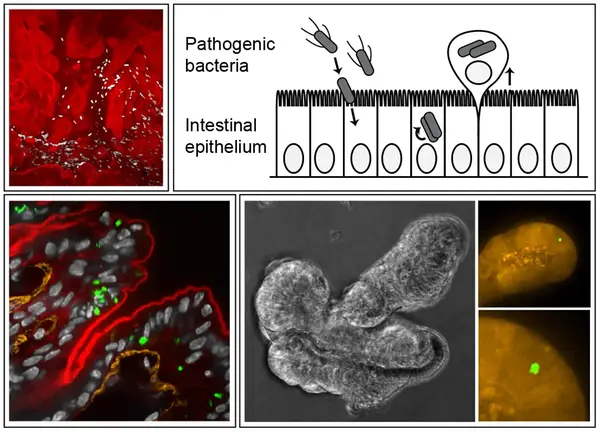Mikael Sellin research group

Molecular mechanisms of enterobacterial gut infection
If you are interested in current openings in the Sellin laboratory, you are welcome to send an email including your CV to mikael.sellin[at]imbim.uu.se.
Gut infections constitute a leading cause of morbidity worldwide, with estimates of up to two billion disease cases annually. Enterobacteria, such as Salmonella, Escherichia, and Shigella species account for more than half a billion of these infections. Pathogenic enterobacteria are characterized by the ability to bind and/or invade the epithelium of the intestinal mucosa, thereby triggering an inflammatory tissue response. Antibiotic treatment has proven remarkably inefficient at clearing these infections and may in some cases even increase bacterial shedding from the infected individual. Moreover, the heavy use of antibiotics in healthcare and agriculture has led to a fast spread of resistance mechanisms among enterobacterial isolates. Hence, we have both curiosity-driven and clinical incentives to better understand the relevant microbe – host interactions that drive progression of intestinal inflammatory disease.
The mechanisms of pathogen - host cell interplay have traditionally been studied in simplified cell culture settings, where pure bacteria and tumour-derived cell lines are mixed in a culture medium. Such experiments continue to uncover a wealth of potential biochemical interactions between microbe and host cell. However, to understand the relevant molecular and physiological underpinnings of a “real” gut infection, additional approaches are needed. Recent developments in high-resolution microscopy techniques and experimental models now allow us to tackle how enterobacterial disease progresses on the cellular and molecular level also under more physiological conditions. The Sellin lab employs comparative cell biology, organotypic tissue culture, analysis of intact infected tissues, state-of-the-art microscopy, and clinically relevant pathogens (i.e. Salmonella and Shigella species), to explore the mechanisms sparking enterobacterial gut disease. The ambition is that our fundamental work will form the basis for future therapeutic approaches against these challenging infectious agents.
They disarm the intestines’ enemies (Film produced by SSF 2021)
